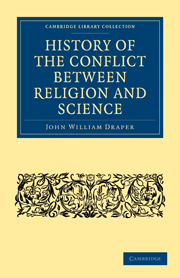Book contents
- Frontmatter
- Preface
- Contents
- CHAPTER I THE ORIGIN OF SCIENCE
- CHAPTER II THE ORIGIN OF CHRISTIANITY.—ITS TRANSFORMATION ON ATTAINING IMPERIAL POWER.—ITS RELATIONS TO SCIENCE
- CHAPTER III CONFLICT RESPECTING THE DOCTRINE OF THE UNITY OF GOD.—THE FIRST OR SOUTHERN REFORMATION
- CHAPTER IV THE RESTORATION OF SCIENCE IN THE SOUTH
- CHAPTER V CONFLICT RESPECTING THE NATURE OF THE SOUL.—DOCTRINE OF EMANATION AND ABSORPTION
- CHAPTER VI CONFLICT RESPECTING THE NATURE OF THE WORLD
- CHAPTER VII CONTROVERSY RESPECTING THE AGE OF THE EARTH
- CHAPTER VIII CONFLICT RESPECTING THE CRITERION OF TRUTH
- CHAPTER IX CONTROVERSY RESPECTING THE GOVERNMENT OF THE UNIVERSE
- CHAPTER X LATIN CHRISTIANITY IN RELATION TO MODERN CIVILIZATION
- CHAPTER XI SCIENCE IN RELATION TO MODERN CIVILIZATION
- CHAPTER XII THE IMPENDING CRISIS
- INDEX
CHAPTER II - THE ORIGIN OF CHRISTIANITY.—ITS TRANSFORMATION ON ATTAINING IMPERIAL POWER.—ITS RELATIONS TO SCIENCE
Published online by Cambridge University Press: 29 August 2010
- Frontmatter
- Preface
- Contents
- CHAPTER I THE ORIGIN OF SCIENCE
- CHAPTER II THE ORIGIN OF CHRISTIANITY.—ITS TRANSFORMATION ON ATTAINING IMPERIAL POWER.—ITS RELATIONS TO SCIENCE
- CHAPTER III CONFLICT RESPECTING THE DOCTRINE OF THE UNITY OF GOD.—THE FIRST OR SOUTHERN REFORMATION
- CHAPTER IV THE RESTORATION OF SCIENCE IN THE SOUTH
- CHAPTER V CONFLICT RESPECTING THE NATURE OF THE SOUL.—DOCTRINE OF EMANATION AND ABSORPTION
- CHAPTER VI CONFLICT RESPECTING THE NATURE OF THE WORLD
- CHAPTER VII CONTROVERSY RESPECTING THE AGE OF THE EARTH
- CHAPTER VIII CONFLICT RESPECTING THE CRITERION OF TRUTH
- CHAPTER IX CONTROVERSY RESPECTING THE GOVERNMENT OF THE UNIVERSE
- CHAPTER X LATIN CHRISTIANITY IN RELATION TO MODERN CIVILIZATION
- CHAPTER XI SCIENCE IN RELATION TO MODERN CIVILIZATION
- CHAPTER XII THE IMPENDING CRISIS
- INDEX
Summary
Religious condition of the Roman Republic.—The adoption of imperialism leads to monotheism.—Christianity spreads over the Roman Empire.—The circumstances under which it attained imperial power make its union with Paganism a political necessity.—Tertullian's description of its doctrines and practices.—Debasing effect of the policy of Constantine on it.—Its alliance with the civil power.—Its incompatibility with science.—Destruction of the Alexandrian Library and prohibition of philosophy.—Exposition of the Augustinian philosophy and Patristic science generally.—The Scriptures made the standard of science.
In a political sense, Christianity is the bequest of the Roman Empire to the world.
At the epoch of the transition of Rome from the republican to the imperial form of government, all the independent nationalities around the Mediterranean Sea had been brought under the control of that central power. The conquest that had befallen them in succession had been by no means a disaster. The perpetual wars they had maintained with each other came to an end; the miseries their conflicts had engendered were exchanged for universal peace.
Not only as a token of the conquest she had made, but also as a gratification to her pride, the conquering republic brought the gods of the vanquished peoples to Rome. With disdainful toleration, she permitted the worship of them all. That paramount authority exercised by each divinity in his original seat disappeared at once in the crowd of gods and goddesses among whom he had been brought. Already, as we have seen, through geographical discoveries and philosophical criticism, faith in the religion of the old days had been profoundly shaken. It was, by this policy of Rome, brought to an end.
The kings of all the conquered provinces had vanished; in their stead one emperor had come. The gods also had disappeared.
- Type
- Chapter
- Information
- History of the Conflict between Religion and Science , pp. 34 - 67Publisher: Cambridge University PressPrint publication year: 2009First published in: 1875



